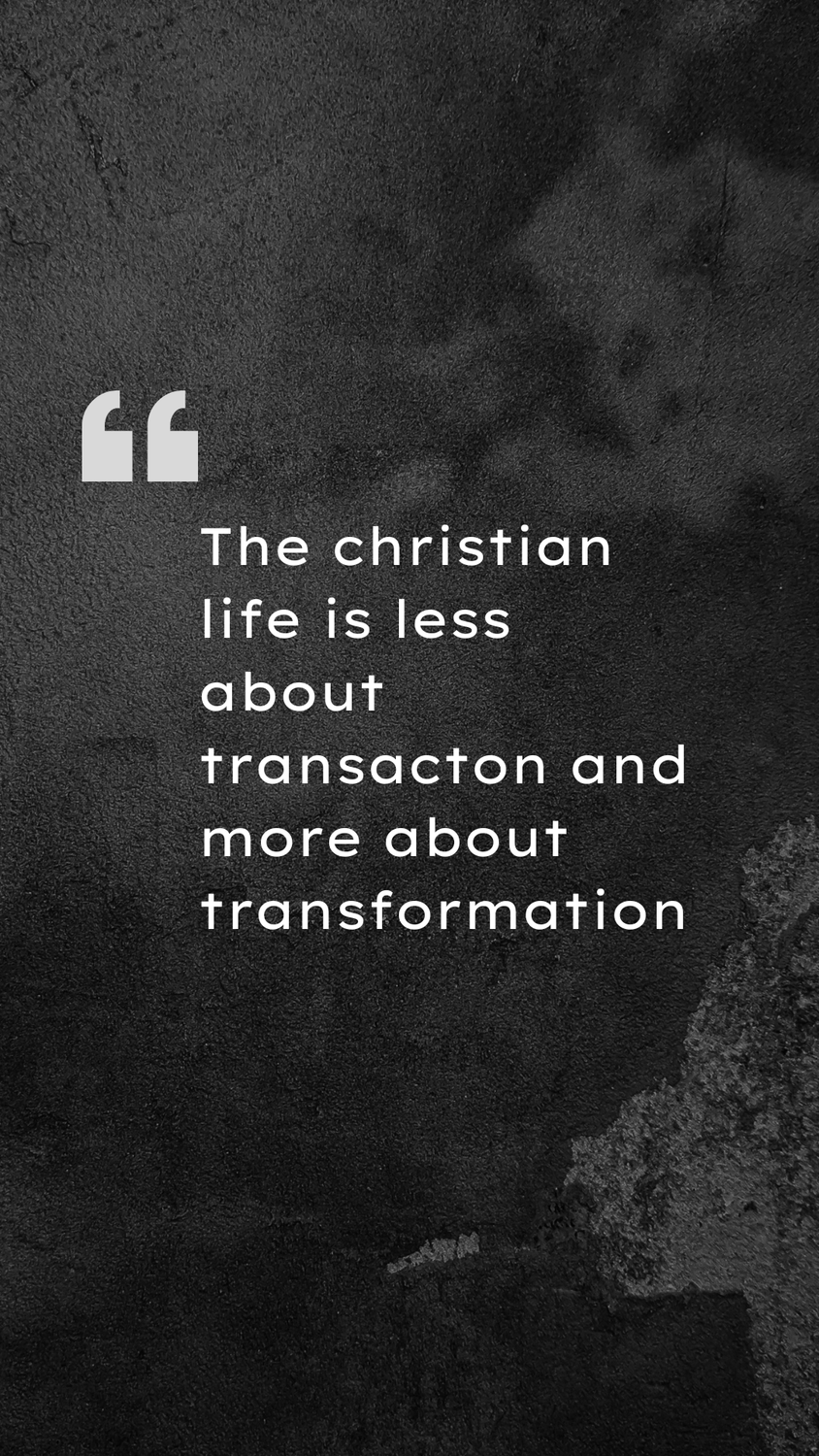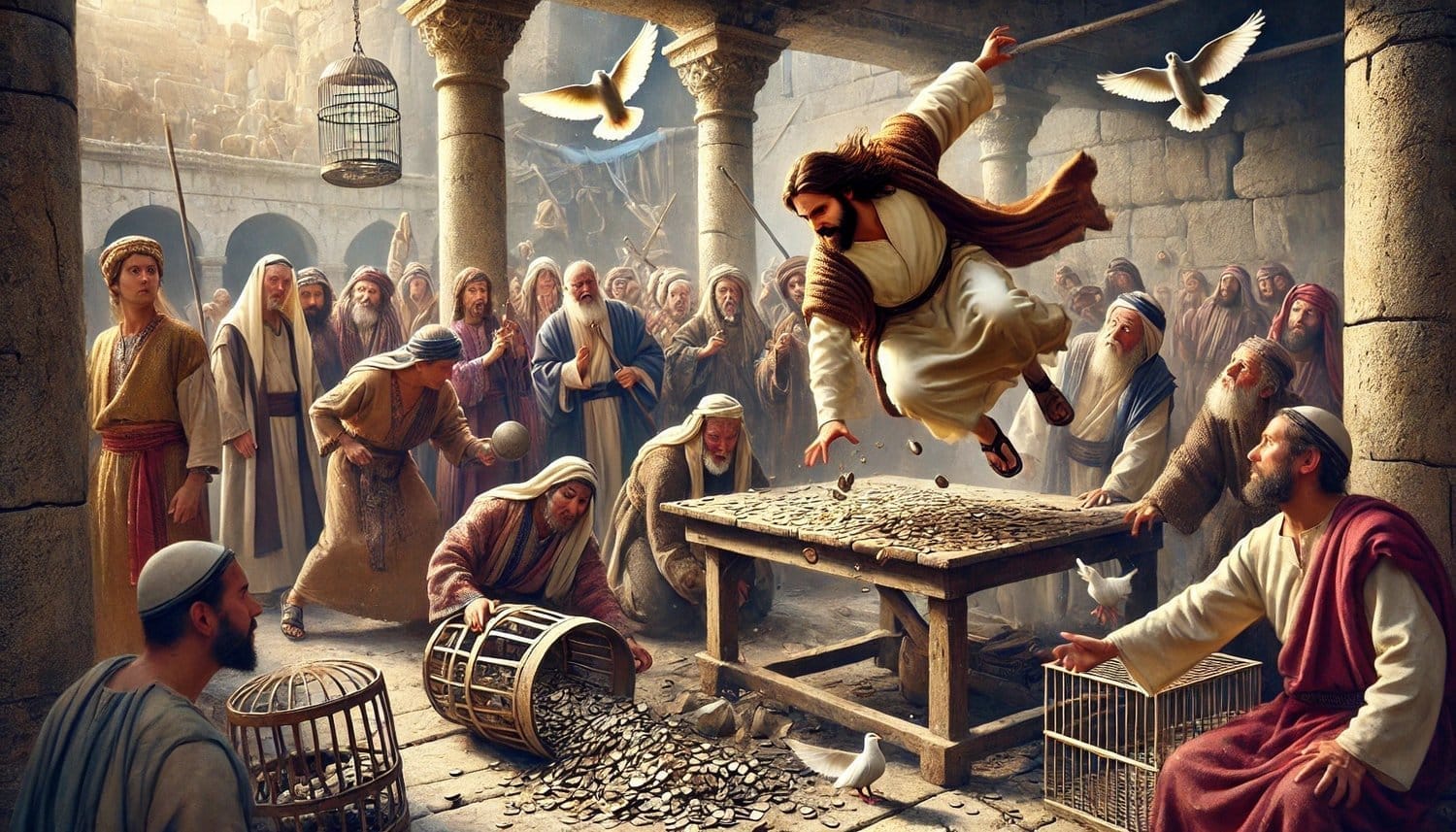From Covenant to Contract: How the Church Became Transactional
Breaking Free from Performance Culture and Finding
Our True Identity in Christ
We Didn't Start This Way!
The early Church was all about presence, prayer, and people.
They gathered in homes, shared meals, and carried each other’s burdens.
No stages, no spotlights, no flashy productions—just a raw, real commitment to Jesus and to one another. Back then, leadership was about serving, not performing. It was relational, humble, and grounded in love. The Church was a family, not a business.
Historically, the early Church met in house churches—small communities built on shared life and mutual care (Acts 2:42–47). Leaders were elders and deacons who served with humility, focusing on the spiritual gifts God gave rather than titles or status.
But as Christianity grew, things changed. After Emperor Constantine’s conversion in the 4th century, the Church became more formal and institutionalized. Bishops, councils, and liturgies developed, bringing structure but also bureaucracy. Over centuries, the Church gained political power and became more organized—sometimes at the expense of intimacy and simplicity.
Fast forward to the modern Western Church, and the shift accelerated. With the rise of the industrial age came a new way of thinking—efficiency, productivity, and measurable results became king.
These values weren’t just societal; they quietly infiltrated our churches too.
We began building systems instead of families.
We started measuring success by growth, output, influence, and how polished everything looked. We borrowed corporate structures, marketing models, and began treating ministry like a career path.
This didn’t happen overnight. It’s a mindset that’s been and institutional models has inbred itself into how we do ministry—and how we view ourselves.
Before we knew it, we were caught in a culture of performance. Not just on platforms.
In the pews.
In the pulpit.
In our hearts.
We learned to:
Celebrate the gifted, but overlook the grieving.
Praise the productive, but ignore the quiet.
Honor the builders, but forget the broken.
Slowly, our worth got tied to what we do. Our belonging linked to how useful we are.
And even our identity shaped by how visible or “seen” we feel.
I remember the moment I realised this was crushing me.
I was leading well, teaching, serving—“on fire” by all appearances. But inside, I was breaking.
The pressure to perform, to always produce, was exhausting my soul. I felt invisible in my weariness because no one had taught me it was okay to just be.
We never meant to build this kind of culture.
But we did.
And that’s where this story really begins.

This Is What Transaction Looks Like in Real Life
As performance culture took root in our churches and hearts, it reshaped how we saw ourselves—and each other.
We started to believe that love had to be earned. That presence required performance. That rest was weakness.
This wasn’t just a shift in structure—it became a spiritual trap.
It’s subtle at first. You don’t even notice it happening.
But before long, the room you once entered with childlike faith becomes one where you’re unsure if you’re loved… or just useful.
Transaction in the Church sounds like:
“You’re valuable because you’re gifted.”
“We miss you on the roster — when can you serve again?”
“You’re so anointed!” (but only after you’ve performed well)
“We need to find a replacement for her — she’s burned out.”
And it feels like:
Anxiety when you're not doing enough
Guilt when you need a break
Fear that if you stop serving, you’ll lose connection
Resentment when your worth is measured by output
Shame for needing healing instead of having something to offer
You begin to wonder:
“Am I still welcome here if I’m not on?”
“Would they check in on me if I stopped contributing?”
“Do they love me… or my role?”
In this kind of culture, we unconsciously disciple people into serving for belonging — not from it.
People begin to strive for visibility instead of identity. Leaders start recruiting based on gaps, not grace. We honor the productive and overlook the grieving. Over time, it creates a cycle of burnout and quiet disconnection.
Volunteers quit.
Leaders break.
People leave—not because they stopped loving Jesus,
but because they started wondering if He still loved them when they weren't “doing something.”
This isn’t covenant.
It’s a system of spiritual transaction dressed in Kingdom language.
And I say this with compassion — because I’ve lived it.
And I want to share a encouraging word for those of us caught in it.
For the hidden ones. The overidentified. The exhausted performers. This is for you.
Seen for My Heart, Not My Role
An encouragement for the performers, the hidden ones, and the overidentified

Have you ever felt like your place in the room depended on your performance?
I have.
Not in the early days — but once I was “needed.” Once I had a role. A voice. A title.
Once I became important in the room. And slowly, without even realizing it, I stopped asking:
“Do I belong?”
And started wondering:
“What happens if I stop?”
Because somewhere along the way, being seen for who I was…
got replaced with being seen for what I could do.
💡 This is for two people:
The one who’s hidden, tired, and aching to be loved beyond your usefulness.
And the one who’s upfront, thriving on being needed — but terrified of being still.
If we’re honest… many of us don’t know how to be loved outside our roles.
We say we’re sons and daughters. But we’ve been living like staff in the Father’s house — clocking in and out for worth.
We’ve learned how to:
Lead well… but not rest well.
Inspire others… while secretly unraveling.
Say “it’s all for Jesus”… but panic at the thought of being unseen.
This is the fruit of a performance-based identity.
And it’s killing the joy of too many faithful people.
⚠️ When Ministry Becomes a Mask
There were moments I didn’t know where “me” ended and “my ministry” began.
The line between calling and codependency got blurry.
I wasn’t just serving anymore — I was proving.
Proving I was valuable.
Proving I deserved the mic.
Proving I was spiritual enough to be loved.
And what I didn’t realize was…
Every time I led from that place, I was asking people to love a version of me that wasn’t whole.
The Lie: “I Am What I Do”
This lie is rampant in church culture.
It hides behind excellence.
It hides behind urgency.
It hides behind, “But they need me.”
But underneath it all is fear:
“If I’m not functioning, will anyone still choose me?”
That’s not covenant.
That’s transaction.
And the Father is not building with that spirit anymore.

When Performance Hinders the Kingdom
This isn’t just a personal crisis — it’s a Kingdom one.
Performance culture doesn’t just steal our peace.
It distorts our witness.
It builds churches that run like machines, but forget they were meant to move like families.
It produces leaders who are overextended, volunteers who feel used, and communities that look busy… but are spiritually brittle.
We build platforms instead of people.
We multiply content but not disciples.
We confuse gifting for character… and polish for fruit.
And I’ve seen it.
In myself.
In the ministries I’ve been part of.
We run so hard trying to “do the work of the Lord,” and we burn out in the process.
I’ve watched it cycle through elders, pastors, leaders, and volunteers—constantly churning through people because rest wasn’t built into the rhythm. We called it revival, but it was often just exhaustion dressed up in excellence. We praised momentum but ignored the silent breaking beneath the surface.
And the fruit?
We extend influence, not intimacy.
We grow churches, but not always the Kingdom.
We gain followers but lose sons and daughters.
We make converts… but rarely covenant.
Performance-based ministry may impress a crowd, but it rarely transforms a heart.

Jesus Doesn’t Love Like That
The good news? Jesus is not like this.
He didn’t come to recruit spiritual employees.
He came to adopt sons and daughters.
He didn’t say,
“Come to Me, all who are gifted and performing…”
He said,
“Come to Me, all who are weary and burdened, and I will give you rest.” — Matthew 11:28
When He saw the temple filled with profit-driven performance and transactional religion,
He flipped the tables.
Why?
Because His Father’s house was meant to be a place of presence, not pressure. Of prayer, not performance.
Of communion, not consumerism.
Jesus wasn’t impressed by outward displays. He rebuked the religious elite who loved public applause but saw and celebrated the widow who gave her last coin in secret. He stopped for the bleeding woman who was too unclean to be touched. He defended Mary when she “wasted” oil at His feet instead of doing something “useful.” He washed feet — when He could have demanded worship. He cooked breakfast for a man who denied Him.
This is our Jesus.
He walked slowly.
He healed freely.
He loved deeply.
And He never confused someone’s usefulness with their value.
Jesus didn’t need you to do something great before calling you “beloved.” The Father said of Him, “This is My Son, whom I love; with Him I am well pleased” — before Jesus performed a single miracle. — Luke 3:22
He calls you the same.
Before you lead.
Before you serve.
Before you build.
Before you get it right.
Even after you get it wrong.
He doesn’t choose the impressive — He chooses the surrendered.
He empowers those He calls.
It’s not your resume He wants — it’s your heart.
Jesus doesn’t demand performance — He invites surrender.
He doesn’t love you more when you're busy — He loves you fully when you’re still.
He never once told His disciples,
“Go make things happen.”
He said,
“Abide in Me… and you will bear much fruit.” — John 15:5
If you’ve been running, earning, or proving — Jesus is calling you back.
Back to the table, not the stage.
Back to friendship, not function.
Back to covenant, not contract.
If this is exposing, you — good. It’s exposing me too.
This word isn’t just for the burnt out. It’s for those of us still striving… still productive…
Still terrified of being still.
Still wondering deep down:
Would He still want me if I stopped?
The answer? Yes.
A thousand times, yes.
Jesus wants your heart, not your hustle. He wants you whole, not just helpful. He wants you near, not just needed.
You are not an employee in the Kingdom.
You’re a child.
A beloved one.
Chosen, not because of your fruit… but because of His love.
Let the transaction die.
And return to the One who paid the price in full — so you wouldn’t have to.

A Heartfelt Prayer
Jesus, we come back to You.
We lay down our striving, our proving, and our performing.
We lay down every title, every role, every place we’ve found identity outside of You.
We repent for the ways we’ve measured our worth by our usefulness,
for building platforms instead of people,
and for thinking You loved us more when we were “on.”
Tear down the altars we’ve made to performance and polish.
Strip away the pressure, the comparison, the need to be seen.
Bring us back to first love.
Back to intimacy.
Back to the simplicity of being Yours.
Heal the part of us that thought we had to earn our place.
Restore the places in us that forgot we are sons and daughters first.
And call us again—not to function, but to follow.
We don’t want to live by transaction.
We want to walk in covenant.
Make us whole again…
Not because we are needed—
But because we are Yours.
Amen.
Scripture Anchors
“I have loved you with an everlasting love;
I have drawn you with unfailing kindness.”
— Jeremiah 31:3
“Come to Me, all you who are weary and burdened, and I will give you rest.”
— Matthew 11:28
“You are My Son, whom I love; with You I am well pleased.”
— Luke 3:22 (spoken before Jesus began His ministry)
“Abide in Me, and I in you. As the branch cannot bear fruit by itself, unless it abides in the vine, neither can you, unless you abide in Me.”
— John 15:4–5
“God chose the foolish things of the world to shame the wise… so that no one may boast before Him.”
— 1 Corinthians 1:27–29
Reflect & Respond - For Individuals
Take a breath. Let the Holy Spirit search your heart and gently reveal what needs healing.
Where have I attached my identity to what I do, rather than who I am in Christ?
Have I believed that I need to be “needed” in order to feel seen or valuable?
Do I feel anxious when I’m not producing, serving, or leading something? Why?
When was the last time I experienced rest in God — without guilt, pressure, or striving?
Have I equated God’s approval with fruitfulness, visibility, or performance?
What am I afraid would happen if I stepped back or stopped performing?
What is Jesus inviting me to lay down… and what is He inviting me back into?
Where do I need healing so I can walk in identity, not transaction?
Reflect & Respond — For Pastors, Elders & Leaders
Take this before God in prayer and humility. You are not just building people — you are also being built.
Have I unintentionally led from a performance-based culture rather than covenant?
Do I place more value on what people do than who they are?
Have I created space for rest, renewal, and wholeness within our leadership culture?
Are we discipling people into freedom or into function?
Have I upheld “faithfulness” at the expense of people’s mental, spiritual, or emotional health?
Do I celebrate the unseen, the quiet, and the hidden — or only the visible and productive?
Where have I personally been performing instead of abiding?
Is our culture producing fruit of the Spirit… or fruit of pressure?
Part Four: Performance vs Presence - CLICK HERE
Disclaimer
This series is not written as a critique of any one church, leader, or denomination — but as a prophetic reflection on a culture many of us have experienced or contributed to. My heart is for the Church — to see her healed, restored, and walking in covenant love again. If you're a pastor or leader, please know this is not an accusation — it’s an invitation. May we all be willing to let God search our hearts and shape us more into His image.
SHARE
POST CATEGORY




